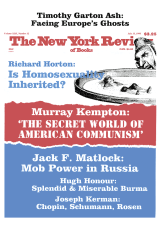To the Editors:
Following the correspondence in your columns last year about the repression of the press in Indonesia, your readers may be interested to know in more detail how press censorship functions when it falls short of the actual closure of newspapers. In June 1994, three papers, Editor, De Tik, and Tempo, had their publishing licenses withdrawn by the Indonesian government. Sinar, a magazine that commented on the demonstrations that followed the bannings, made several uncontentious points: that demonstrations are normal manifestations of democracy, not a novelty in Indonesia; the banned publications had been valued as a news source for the public and, furthermore, had been banned without any hearing or judicial review. In essence, Sinar concluded “the problem is the demand for justice.”
Readers may easily imagine the impact of a letter that Sinar received in July from the Dr. Subatra, Director-General of Press Guidance and Graphics, following the publication of this analysis. The Director-General’s letter strikingly refutes the view that bureaucratic language is necessarily an impediment to clear communication.
“Whether intentionally or not, these articles will have the effect of clouding the issue and will in the end confuse the public…The above-mentioned articles were accompanied by photographs of demonstrations that occurred from former days…which can indirectly encourage demonstrators to do likewise…I herewith issue a warning to Sinar magazine regarding the publication of…articles which do not conform with, and in fact are in contravention of, healthy and responsible press freedom…I trust you will pay serious heed to this warning so as to avoid a situation in which the government is forced to take action that none of us want.”
Recent developments highlight the courage of journalists struggling to promote press freedom in such a climate. Following the closures of June 1994, journalists from the banned papers joined with colleagues to form an independent trade union, the Alliance of Independent Journalists (AJI), dedicated to upholding press freedom. Journalists associated with AJI have consistently been refused permits to establish new publications; and when they produced unlicensed periodicals, they suffered arrest and harassment. Three journalists arrested in March 1995 are still detained. The government, through the agency of a government-sponsored association of journalists, has sought to prevent editors from employing any AJI members.
There is one gleam of hope in the generally deteriorating situation. On May 3, 1995, Indonesia’s administrative court in Jakarta overturned the ban on Tempo magazine, imposed on June 21, 1994. The judge ordered the Ministry of Information to grant a new license, saying that the decree revoking the permit was legally flawed. The Ministry of Information is likely to appeal the judgment. This is a moment when international leaders could usefully express concern about the future of press freedom in Indonesia.
Catherine Drucker
Campaigns Co-ordinator
Article 19, International
Centre Against Censorship
London, England
This Issue
July 13, 1995



